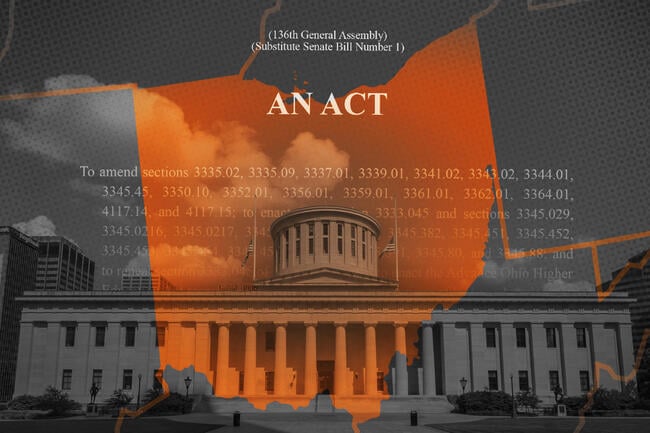You have /5 articles left.
Sign up for a free account or log in.

Central Ohio Technical College says it hasn’t signed a union contract because of SB 1.
Photo illustration by Justin Morrison/Inside Higher Ed | Photo: Creative Commons | Documents: Ohio House of Representatives
United Faculty of Central Ohio Technical College union members and their institution are both citing state law in a dispute over whether the institution must sign a new collective bargaining agreement—or gut provisions it agreed to earlier in order to comply with the state’s sweeping new public higher education law.
The fight is an early example of the way broad postsecondary laws passed by multiple red states this year are beginning to affect colleges and universities. These laws haven’t just targeted diversity, equity and inclusion programs; some have impacted labor rights.
On March 28, Ohio’s Republican governor, Mike DeWine, signed into law Senate Bill 1, marking the culmination of two years of controversy in the state over GOP lawmakers’ attempts to pass legislation increasing regulation of higher ed institutions.
Among other things, SB 1 allows “immediate and for cause post-tenure review” for university faculty members, prohibits full-time faculty from striking, bans DEI offices, mandates online posting of undergraduate course syllabi, and requires institutions to “demonstrate intellectual diversity” in a range of areas. Relevant to the Central Ohio Technical College situation, it also prohibits unions from using their collective bargaining rights to negotiate over faculty workload and evaluation.
SB 1 also sets specific statewide requirements for annual faculty evaluations, including that at least 25 percent of the teaching component of these reviews must be based on students’ own evaluations of the educator, and these students must at least be asked, “Does the faculty member create a classroom atmosphere free of political, racial, gender, and religious bias?”
Union and college negotiators reached a tentative agreement in March for a new, three-year union contract, and the union members voted in April to approve that deal, said Martin Schmerr, the union’s president and a biology professor. The institution’s Board of Trustees was set to vote last month to finish approving it, Schmerr said.
But on May 19, the evening before the board meeting, John Berry, the college’s president, wrote to Schmerr about a “last-minute” issue, according to emails that Schmerr provided Inside Higher Ed.
“After receiving additional legal guidance, we’ve determined that we are not able to proceed with ratification,” Berry wrote. He said SB 1 includes provisions that would affect the faculty workload and evaluation sections of the proposed contract.
“Language inconsistent with SB 1 must be removed,” Berry wrote, adding that “because our agreement is set to take effect after the effective date of the law, we are legally required to ensure it is fully compliant at the time it is approved.”
The college’s delay in approving the contract could have consequences if it isn’t signed soon. While DeWine signed SB 1 into law March 28, its provisions don’t go into effect until June 27, and the new union contract wouldn’t start until Sept. 1. The part of the law banning bargaining over faculty workload and evaluation says that the prohibition only applies to any “agreement entered into on or after the effective date of this section.” If “entered into” means the date the contract is signed, getting a signature before June 27 could be significant.
The board voted down the tentative agreement, and Berry has asked the union to return to the bargaining table to hash out a revision. But the union is instead using its own legal argument to demand that the college approve the original agreement: Representatives point to a state collective bargaining law that says agreements are automatically approved if college boards fail to act on them within 30 days of receiving a finalized deal.
“The contract is now accepted,” Schmerr told Inside Higher Ed, also noting that SB 1 isn’t yet in effect.
“I really feel that this is an intention to weaken the contract language,” Schmerr said.
Last Thursday, Berry presented the union a proposed compromise: Delete several pages of contract provisions and replace them with sentences saying, “workload shall be determined” and “evaluations shall be administered” in accord with college policy.
The new proposal also includes a provision saying that if a citizen referendum vote, which has been proposed, overturns SB 1’s ban on bargaining over evaluation and workload, the college would reinsert the original agreement’s deleted provisions “to the extent permitted by law.”
In an email to Inside Higher Ed, a college spokesperson wrote that Central Ohio Technical College “understands the union’s opposition to the Act and recognizes the union’s efforts to challenge the Act through a state-wide referendum. In good faith, COTC has now proposed a reversion provision that will reinstate these two provisions, should they become lawful subjects of bargaining again, as a result of the referendum. COTC believes this is an opportunity to resolve the matter constructively.”
But, on Friday, the union filed an unfair labor practice charge with Ohio’s State Employment Relations Board. The union—which Schmerr said represents 51 full-time faculty and is affiliated with the Ohio and American Federation of Teachers—is also planning an on-campus rally today.
“The college is engaging in bad-faith bargaining, because they do have an obligation to sign,” Schmerr told Inside Higher Ed. He said his primary reason for not wanting to give up on the original deal’s language is because a referendum or lawsuit may overturn all or part of SB 1.
“If we remove that contract language and the law is repealed, that contract language is lost, and that’s very hard to restore,” he said. “Removing that language prematurely is really designed to weaken collective bargaining power.”




